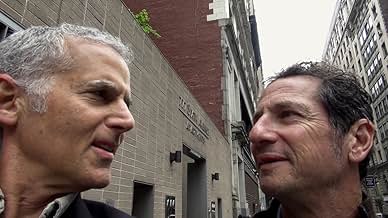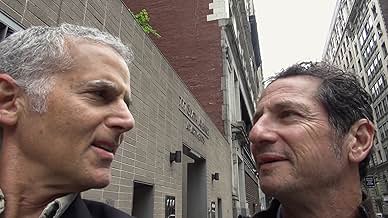IMDb रेटिंग
5.4/10
1.4 हज़ार
आपकी रेटिंग
अपनी भाषा में प्लॉट जोड़ेंA mind-boggling coincidence leads the filmmaker to track down his fifth grade class and fifth grade teacher to examine their memory of and complicity in a bullying incident 50 years ago.A mind-boggling coincidence leads the filmmaker to track down his fifth grade class and fifth grade teacher to examine their memory of and complicity in a bullying incident 50 years ago.A mind-boggling coincidence leads the filmmaker to track down his fifth grade class and fifth grade teacher to examine their memory of and complicity in a bullying incident 50 years ago.
- 1 ऑस्कर के लिए नामांकित
- 3 जीत और कुल 7 नामांकन
फ़ीचर्ड समीक्षाएं
I'll start off to say at the outset that I was bullied relentlessly in school. The first observation I have is that I turned out ok, and I have a good life. I've been successful. The second observation I have is that, despite my adaptation, the bullying I experienced affects me negatively to this day. Both of these are true. What's more, I've talked to some of my childhood bullies now that we're 30+ years away from the incidents, and I've enjoyed getting their perspective on these things. It also helps, weirdly, that some of them have apologized.
So, that's my perspective, and I feel it's a complete perspective because it involves everyone who was actually involved, and it processes the emotions we all feel for this. I feel that in a lot of ways I've been able to process the situation I was in, and I've also been able to help others process their involvement, by hearing their apologies in most cases, and also forgiving. I mean, that isn't what I set out to do, but it's a healing process and for me it works.
This documentary doesn't do that. For some reason, it sticks strictly to the perspective of the bullies, interviewing them at various points, and so along with the documentarian, we get the perspective of the classmates involved in a vicious bullying incident to which most of them were involved.
The documentarian decided to pass on including the bullied kid. His reasoning was shallow at best -- he seems not to have wanted to portray the victim of bullying as having been able to get past his experiences and to become successful. There are so many things wrong with that approach, but the first is that the documentarian is seeking to portray a preferred reality rather than the reality as it exists outside of his head -- that reality being his preference not to "minimize" his bullying by showing a person who came out of it able to function and function well. Like it or not, that IS the reality in this case, and it shouldn't be dodged.
The second reason is related to the first, in that, by excluding the victim for that reason, he has missed possibly seeing the intricacies that go beyond simply how successful the man was in life. Being someone who is also successful in life, I can tell you that doesn't mean that the feelings were not necessary to process, and the contact with past bullies has helped me in ways even I didn't expect. That would have been the way to approach this -- but the documentarian took the easy way out. Imagine going all the way to Florida to visit the elderly teacher to discuss the incident in question, an incident she doesn't even remember, but not including the victim of the bullying. It's just a weird step to take, and the reasoning used simply sounds, feels, and tastes like a copout.
I spend most of my time watching documentaries. It's really one of the few types of television I watch. I've noticed that documentaries more and more attempt to portray from facts to a desired conclusion rather than present the facts for a clear conclusion, and editing is the chief tool in making this happen. So I realize this is technically what most documentaries have become, but I think there's a fine line somewhere that this one crossed that others have not. It crossed from documentary into docudrama without actually saying so, and the documentarian crossed from documentarian to the broader category of filmmaker, or even entertainer. Unfortunately, I cannot really recommend the result.
So, that's my perspective, and I feel it's a complete perspective because it involves everyone who was actually involved, and it processes the emotions we all feel for this. I feel that in a lot of ways I've been able to process the situation I was in, and I've also been able to help others process their involvement, by hearing their apologies in most cases, and also forgiving. I mean, that isn't what I set out to do, but it's a healing process and for me it works.
This documentary doesn't do that. For some reason, it sticks strictly to the perspective of the bullies, interviewing them at various points, and so along with the documentarian, we get the perspective of the classmates involved in a vicious bullying incident to which most of them were involved.
The documentarian decided to pass on including the bullied kid. His reasoning was shallow at best -- he seems not to have wanted to portray the victim of bullying as having been able to get past his experiences and to become successful. There are so many things wrong with that approach, but the first is that the documentarian is seeking to portray a preferred reality rather than the reality as it exists outside of his head -- that reality being his preference not to "minimize" his bullying by showing a person who came out of it able to function and function well. Like it or not, that IS the reality in this case, and it shouldn't be dodged.
The second reason is related to the first, in that, by excluding the victim for that reason, he has missed possibly seeing the intricacies that go beyond simply how successful the man was in life. Being someone who is also successful in life, I can tell you that doesn't mean that the feelings were not necessary to process, and the contact with past bullies has helped me in ways even I didn't expect. That would have been the way to approach this -- but the documentarian took the easy way out. Imagine going all the way to Florida to visit the elderly teacher to discuss the incident in question, an incident she doesn't even remember, but not including the victim of the bullying. It's just a weird step to take, and the reasoning used simply sounds, feels, and tastes like a copout.
I spend most of my time watching documentaries. It's really one of the few types of television I watch. I've noticed that documentaries more and more attempt to portray from facts to a desired conclusion rather than present the facts for a clear conclusion, and editing is the chief tool in making this happen. So I realize this is technically what most documentaries have become, but I think there's a fine line somewhere that this one crossed that others have not. It crossed from documentary into docudrama without actually saying so, and the documentarian crossed from documentarian to the broader category of filmmaker, or even entertainer. Unfortunately, I cannot really recommend the result.
There was no deep meaning to be gleaned from this story. The ego of the filmmaker and those who participated were dismissive of their own actions while trying to shift blame away from these animals.
There was one woman (with a c) interviewed who claimed to feel guilty while smiling and laughing through her entire interview. She seemed particularly proud of herself.
You can easily sum up this very bad movie when at the end of the film the director says..."felt bad for the way you were treated" instead of "felt bad for the way WE treated you." What a joke.
There was one woman (with a c) interviewed who claimed to feel guilty while smiling and laughing through her entire interview. She seemed particularly proud of herself.
You can easily sum up this very bad movie when at the end of the film the director says..."felt bad for the way you were treated" instead of "felt bad for the way WE treated you." What a joke.
What a shallow, narcissistic, self-absolving exploitation of a childhood victim's trauma, replete with re-victimization and bad mouthing.
The fact that it "earned" an Oscar nom should confirm everything you must already think about The Academy, and is entirely congruent with the Wil Smith standing ovation.
The fact that it "earned" an Oscar nom should confirm everything you must already think about The Academy, and is entirely congruent with the Wil Smith standing ovation.
Self serving, self congratulatory trash. The worst kind of human trauma exploitation. Could this man not have at least read a book about the lasting effects of child abuse? "I guess I'm not as sensitive as I thought..." You have no idea.
Contrary to most on this network, I don't think we should only listen the victims. I think that to solve any problem, especially something endless and something that happened to so many, we need to try to understand it as a society.
Now, I have some issues with the tone of this one. The music selected was weird and doesn't seem the right one for the moment. It doesn't seem to take the issue strongly and seriously enough, even if in the end the messages are mostly right. I like what it tries to do and tell, but I have some issues in how it tell us that.
Now, I have some issues with the tone of this one. The music selected was weird and doesn't seem the right one for the moment. It doesn't seem to take the issue strongly and seriously enough, even if in the end the messages are mostly right. I like what it tries to do and tell, but I have some issues in how it tell us that.
क्या आपको पता है
- भाव
Jay Rosenblatt: For me the memory was vague; all I knew for sure is that it happened and I participated.
- क्रेज़ी क्रेडिटThe very end of the credits features more stop motion animation of the Dick photo on the playground as it quickly "walks" off-screen.
- कनेक्शनReferences The Smell of Burning Ants (1994)
टॉप पसंद
रेटिंग देने के लिए साइन-इन करें और वैयक्तिकृत सुझावों के लिए वॉचलिस्ट करें
विवरण
- चलने की अवधि36 मिनट
- रंग
- पक्ष अनुपात
- 16 : 9
इस पेज में योगदान दें
किसी बदलाव का सुझाव दें या अनुपलब्ध कॉन्टेंट जोड़ें


















